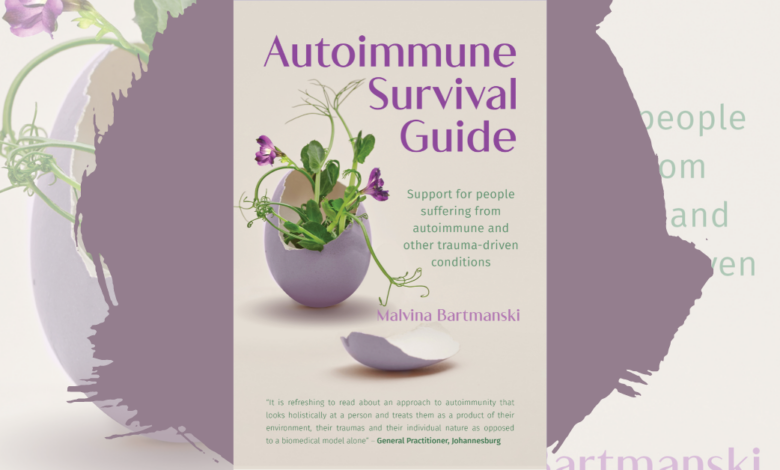Scientists have agreed that our genes have remained the same over the last few decades, yet the prevalence of autoimmunity has risen. So, if our internal landscape has not changed to create this problem, then something in our external world must have.
We have industrial agriculture serving our dinner plates while society relentlessly pushes us to participate in the rat race. We possess unhealed childhood trauma that may express itself in many ways, from people-pleasing tendencies to psoriasis. Clearly, the world has evolved into a breeding ground for toxins and autoimmune conditions. But how can we help our worn nervous system overcome it for good?
On this week’s Wellness Wednesday, we spoke to Malvina Bartmanski, a clinical psychologist and author of ‘Autoimmune Survival Guide’. Her successful triumph in reversing the early onset of Hashimoto’s Disease drove her to write the book and expand her practice’s focus from complex trauma to autoimmune conditions and their link. She explained how a heavily stressed and traumatized society and our persistent exposure to toxins and pathogens is the recipe for autoimmunity.
Autoimmunity can be the body’s response to trapped trauma in the nervous system
Research has shown that autoimmune disorders are driven by a nervous system that has been dysregulated by trauma and stress. Traumatized nervous systems then act to suppress the healthy immune system, elevating inflammation and allowing pathogens to flourish.
In fact, a study found that a stressful childhood can increase the chance of hospitalization from an autoimmune disease years into adulthood. Trauma can support an ongoing fired-up stress response (as opposed to a fleeting lukewarm one) for the rest of a child’s life.
“What’s important in autoimmune conditions is the physical aspects of trauma. The problem with unexpressed trauma is that it becomes a physiological reaction that gets locked in. Our nervous system then becomes suspended with this locked-in energy, which causes the constant release of adrenaline and cortisol,” explained Bartmanski.
Where there’s persistent stress, there’s inflammation
Experiencing negative emotions that may arise from conflicts in relationships, unsettling family homes, divorce, or the death of a loved one, can impact inflammation levels. The same can be said about overextension at work and excessive social media usage.
Basically, psychological distress is an unavoidable by-product of moving through life’s challenges, whether it be in childhood or adulthood. However, it becomes an issue when it’s constantly felt. Bartmanski emphasized that the long-term effect of lifelong stress and accumulated suffering creates intense autonomic overactivity in the body.
On a larger scale, is society to blame?
Autoimmunity is nothing new. 3000-year-old Ayurvedic medicine texts affirm its presence in history. However, its prevalence in the world today and how it has evolved to be chronic in nature creates concern.
1 in 15 people in the U.S. have an autoimmune disease, according to Cleveland Clinic. Bartmanski believes that our modern, society-driven modes of operating contribute largely to this. Research shows that genetics account for approximately 30% of all autoimmune conditions. The other 70% is strongly associated with environmental factors such as modifications to our food, toxic chemicals, personal lifestyles, climate change, and stress. If our environment is mostly governed by society, then society needs to be confronted with the need to reevaluate how we live.
“The lifestyles that we have become accustomed to, from our diets to this rat race energy, to the farming practices that we use and our screen time. We already know from studies that accessing our phones creates adrenal dysregulation. That light is damaging to us. One almost wants to run away from society and go live on coconuts on an island somewhere to avoid this, but we can’t. So, we need to figure out a way forward,” expressed Bartmanski.
The critical role of a trauma-informed and holistic approach
According to Bartmanski, autoimmune conditions will not respond to a symptom-based treatment plan. The key is to reclaim homeostatic balance in the body; integrative medicine and psychotherapy methods are important in achieving this.

Malvina Bartmanski, clinical psychologist and author of “Autoimmune Survival Guide”
The first step is to tame the nervous system by reducing stress in the person’s life and modifying their lifestyle. Emerging evidence suggests a relationship between stress, inflammation, and negative emotions. Essentially, emotional dysregulation contributes to the biological wear and tear of the body.
Therefore, it is vital to assess the person’s work, social, and home environment during the healing process. The next steps revolve around damage control using nutrition. Essential nutrients will be introduced to get the integrity of the liver, gut, and adrenal glands back in order.
A holistic treatment process takes time because it’s tailored to the uniqueness of every person’s case. Every individual has varying degrees of trauma and different causal pathways. The damage to one person may be coming from eating food with agricultural pesticides, while that of another may be triggered by a deeply upsetting time in their lives.
Psychologist’s top 4 supplement recommendations to help autoimmunity
Bartmanski proposed it would be best to get blood tests done with an integrative medicine practitioner. Naturally, it’s helpful to ascertain the exact deficiencies to avoid pushing the body further out of balance. That being said, she would start with the following four supplements and build on them from there.
- Vitamin B: Most people are deficient in vitamin B, especially if they experience high stress. It supports the maintenance of a healthy nervous system.
- Vitamin C: If pathogens are present in your body, then your immune system will need an extra boost. Vitamin C will do the trick.
- NAC: There are often toxins in autoimmune conditions that can impede the liver and gut from executing the detoxification process properly. NAC (N-Acetyl Cysteine) a precursor to glutathione, increases the means of detoxification in the body.
- Magnesium: People with autoimmunity frequently experience anxiety. Fortunately, magnesium can alleviate this as well as assist many other bodily functions.
Bottom line
Autoimmune conditions may be fuelled by childhood traumas, suppressed emotions, and an environment that is disconnected from nature. We may not be able to single-handedly shift societal factors, but we can control personal lifestyle ones. Moreover, adopting a holistic approach to remedy our cortisol-ruled living may be exactly what our unbalanced nervous systems need.
Watch the full interview on Instagram
View this post on Instagram



![women [longevity live]](https://longevitylive.com/wp-content/uploads/2020/01/photo-of-women-walking-down-the-street-1116984-100x100.jpg)










